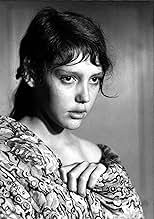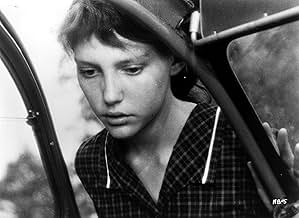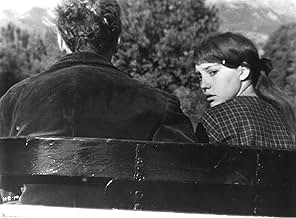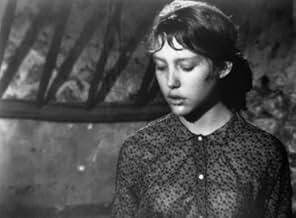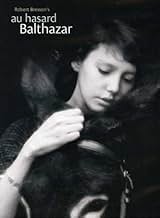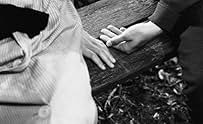AVALIAÇÃO DA IMDb
7,7/10
24 mil
SUA AVALIAÇÃO
A história de um jumento maltratado e das pessoas ao seu redor. Um estudo sobre santidade e uma peça que faz relação com "Mouchette, a Virgem Possuída", também de Robert Bresson.A história de um jumento maltratado e das pessoas ao seu redor. Um estudo sobre santidade e uma peça que faz relação com "Mouchette, a Virgem Possuída", também de Robert Bresson.A história de um jumento maltratado e das pessoas ao seu redor. Um estudo sobre santidade e uma peça que faz relação com "Mouchette, a Virgem Possuída", também de Robert Bresson.
- Prêmios
- 7 vitórias e 2 indicações no total
Mylène Van der Mersch
- Nurse
- (as Mylène Weyergans)
Avaliações em destaque
For all its formal brilliance, this is one of the least watchable films in the world, despite its enchanted opening and fairy tale elements. Seen through the eyes of a much-abused donkey, we are treated to a litany of corruption, legal (a man is accused of fraud), social (provincial France has never seemed so pinched, arid, spiritually void, with its inhabitants leading lives, in Joyce's words, of 'quiet desperation'), criminal (a gang of violent teenage smugglers), and personal (the leader of said gang rapes, with his cronies, his girlfriend, then locks her up naked), as well as a murder and suicide. What makes this possibly bearable is the limpidity and formal beauty of Bresson's style, and admirers refer to his pinpointing spiritual grace in human suffering, but I wouldn't count on it.
The film's ending is one of the most memorable in cinema, and achieves an eerie grace, consistent with its almost unique tone - allusively Biblical and allegorical, yet resistant to specific meanings and interpretations. The plot is a narrative of human cruelty and escalating despair, but always with enough mystery in the motivation to ward off easy condemnations; and perhaps even to indicate divine guidance. Throughout, Wiazemsky seizes on the donkey as a symbol of transcendence(her mother calls it a saint in the end); it's formally christened at the beginning and undergoes something approaching a formal funeral, all of which gives its life the contours of a spiritual journey of discovery. The narrative encompasses both revelations (the interlude in the fair; new tortures like the mean old man who starves and beats him) and retrenchment; both life's austerity, its roots in servitude, and its enormous potential dignity. Never was a donkey filmed so evocatively - but as always with Bresson, the simplicity is thrilling too - there's no false artistry here; no dubious anthropomorphism. A necessary film, and I'm amazed that I'm the first one to be commenting on it here.
The star of Au hasard Balthazar is a donkey, a trained animal that has been led, goaded, into what passes, in an animal sense, for a performance. Of course there is nothing new about this - animals have been stars since Rescued By Rover - yet there is something unique about the performance of the donkey in Au hasard Balthazar, something that strikes one sort of funny if one gets to thinking about it. It has to do with the approach of Robert Bresson, a director whose way of working with actors was, shall we say, unusual. An auteurist in the purest sense, Bresson believed, zealously it seems, that the director should be the sole creative force behind a film, the one person responsible for the movie's tone, its meaning. The problem with most movies, if you look at things in a Bressonian way, is that stubborn habit of actors to sometimes change the meaning, the texture of a scene by how they play it - that irksome tendency of actors to take the creative reins themselves, and slip things into scenes that aren't meant to be there. Bresson's solution to this problem? Rehearse your actors to death, make them do take-after-take until the words no longer mean anything to them, until they have lost the ability to be spontaneous anymore, to do anything but what their director tells them to - in short, break them like animals. The people in Bresson's films perform their actions with the same hollow, mechanical absence-of-will one perceives in a circus elephant rolling a ball, and this is exactly as Bresson wants it, for it allows him to carry out his cinematic plans without fear of their being subverted by an actor who has some contradictory notion in their head of what a scene is supposed to be about, who their character is. The human actors in Au hasard Balthazar, stripped of their emotional tools, their tricks, occupy exactly the same plane as the donkey Balthazar, who is, as they are, a trained animal, an element in a composition.
The first scenes are an idyll: the foal Balthazar, new-stripped from his mother's teat, becomes the favorite pet of a group of kids spending the summer together on a farm. This is a time for frolicking, for amorously carving names into benches - but alas the childish harmony is doomed soon to end. Bresson conveys the fleetingness of youth, cutting quickly through a series of tableaux depicting carelessness and joy slightly darkened by the presence of a sickly young girl; then without warning we're presented with the realities of grown-up existence, embodied most cruelly by the image of poor Balthazar, now grown, harnessed to a salt-wagon (salt having ironically been his favorite treat during his care-free younger days). It's here that Bresson gives us an indication as to the donkey's more-than-animal nature: Balthazar, having been mistreated, rebels against his owner, tips the wagon and, about to be set upon by a mob of men with pitch-forks, flees. Some instinct - or is it conscious will? - leads Balthazar back to the farm, which has been taken over by a former schoolteacher whose daughter, Marie, once one of Balthazar's playmates, still resides, her existence a lonely one. This would seem the beginning of a new happiness for Balthazar, but the donkey's fate is alas still clouded with gloom. Marie becomes the object of the juvenile delinquent Gerard's amorous attentions; for obscure reasons the jaded miscreant is resentful of Balthazar, and avails himself of every opportunity to torture the poor beast.
Tenderness and cruelty live side-by-side in Au hasard Balthazar, and seem equally the product of an almost mindless instinct. Nowhere is this embodied more purely than in the character of Gerard (Francois Lafarge), the angry sadist who becomes Balthazar's chief tormentor. Gerard is capable of being gentle, as demonstrated by his wooing of the poor farm-girl Marie (the Pre-Raphaelite beauty Anne Wiazemsky), but he's equally capable of unfeeling viciousness, as when he ties a piece of newspaper to Balthazar's tail and sets it alight. Is Gerard a good person or a bad one? Does he hate Balthazar, does he love Marie? These questions seem of little concern to Bresson, who views human affairs in terms of irresistible internal forces. Bresson, in a mysterious, vaguely irreverent way, blurs the line between human and animal, brings human behavior into the animal world while elevating Balthazar to the quasi-human. There's an awareness to Balthazar that's more than you would expect from your average quadruped, and it's through this hint of sentience that one begins seeing the saintly qualities in Balthazar, the patient endurance of hardship, the radiance of spirit.
It's an amazingly delicate piece of work by Bresson, an audacious idea carried out with the utmost discretion and skill. Perhaps only Bresson among all filmmakers could've made this idea work, because only he had mastered the art of rendering existence nearly abstract while at the same time achieving powerful emotional effects. If the film were merely symbolist it would be irrelevant - Balthazar can of course be seen as a symbol for a lot of things, but it doesn't seem right to reduce him to some emblem of suffering, some Christ-like trope. Balthazar is above all a character, a protagonist in a drama, but of course in Bresson there is never any sense of conventional drama, of easy emotion. As a storyteller Bresson was efficient but patient - his scenes never go on longer than they need to, yet you wouldn't call the pacing urgent. There's something about Bresson's cutting that keeps the story flowing briskly while never engendering a sense of hurry. He moves from one character to another, one situation to another, with an unfussy ease that shames most conventional directors with their dependence on transitions, devices and segues. The film's very pace helps convey Balthazar's saintly nature, his perseverance. It's a work at once touching, bold, enigmatic and stirringly human.
The first scenes are an idyll: the foal Balthazar, new-stripped from his mother's teat, becomes the favorite pet of a group of kids spending the summer together on a farm. This is a time for frolicking, for amorously carving names into benches - but alas the childish harmony is doomed soon to end. Bresson conveys the fleetingness of youth, cutting quickly through a series of tableaux depicting carelessness and joy slightly darkened by the presence of a sickly young girl; then without warning we're presented with the realities of grown-up existence, embodied most cruelly by the image of poor Balthazar, now grown, harnessed to a salt-wagon (salt having ironically been his favorite treat during his care-free younger days). It's here that Bresson gives us an indication as to the donkey's more-than-animal nature: Balthazar, having been mistreated, rebels against his owner, tips the wagon and, about to be set upon by a mob of men with pitch-forks, flees. Some instinct - or is it conscious will? - leads Balthazar back to the farm, which has been taken over by a former schoolteacher whose daughter, Marie, once one of Balthazar's playmates, still resides, her existence a lonely one. This would seem the beginning of a new happiness for Balthazar, but the donkey's fate is alas still clouded with gloom. Marie becomes the object of the juvenile delinquent Gerard's amorous attentions; for obscure reasons the jaded miscreant is resentful of Balthazar, and avails himself of every opportunity to torture the poor beast.
Tenderness and cruelty live side-by-side in Au hasard Balthazar, and seem equally the product of an almost mindless instinct. Nowhere is this embodied more purely than in the character of Gerard (Francois Lafarge), the angry sadist who becomes Balthazar's chief tormentor. Gerard is capable of being gentle, as demonstrated by his wooing of the poor farm-girl Marie (the Pre-Raphaelite beauty Anne Wiazemsky), but he's equally capable of unfeeling viciousness, as when he ties a piece of newspaper to Balthazar's tail and sets it alight. Is Gerard a good person or a bad one? Does he hate Balthazar, does he love Marie? These questions seem of little concern to Bresson, who views human affairs in terms of irresistible internal forces. Bresson, in a mysterious, vaguely irreverent way, blurs the line between human and animal, brings human behavior into the animal world while elevating Balthazar to the quasi-human. There's an awareness to Balthazar that's more than you would expect from your average quadruped, and it's through this hint of sentience that one begins seeing the saintly qualities in Balthazar, the patient endurance of hardship, the radiance of spirit.
It's an amazingly delicate piece of work by Bresson, an audacious idea carried out with the utmost discretion and skill. Perhaps only Bresson among all filmmakers could've made this idea work, because only he had mastered the art of rendering existence nearly abstract while at the same time achieving powerful emotional effects. If the film were merely symbolist it would be irrelevant - Balthazar can of course be seen as a symbol for a lot of things, but it doesn't seem right to reduce him to some emblem of suffering, some Christ-like trope. Balthazar is above all a character, a protagonist in a drama, but of course in Bresson there is never any sense of conventional drama, of easy emotion. As a storyteller Bresson was efficient but patient - his scenes never go on longer than they need to, yet you wouldn't call the pacing urgent. There's something about Bresson's cutting that keeps the story flowing briskly while never engendering a sense of hurry. He moves from one character to another, one situation to another, with an unfussy ease that shames most conventional directors with their dependence on transitions, devices and segues. The film's very pace helps convey Balthazar's saintly nature, his perseverance. It's a work at once touching, bold, enigmatic and stirringly human.
A truly unique work in cinema. It is simply amazing that a story that is, on the surface, mostly about the life of a donkey can cause you to ponder the mysteries and ironies of life and fate. Bresson created here a model of how to say more with less. The final scene of this film is illustrative of this in its extraordinary ability to deeply move the viewer with only a bare minimum of directorial touch.
The plot lines of Au Hasard Balthazar at times seem forced, sometimes confusing the viewer, and often leaving the characters' motivations unexplained. This matters little, however, because they all follow the same theme that one's actions, explainable or not, are often just a reaction to the environment within which we are placed. The human characters and the donkey are one. Just as Balthazar must succumb to the whims of his owners, so are we humans often just surviving, and submitting to, the actions of those who control us. The film is in many ways a rumination about the free will actually afforded us in life. A key scene is between Marie and the miserly farmer (winemaker?), where the latter expounds upon his philosophy. Money and self-confidence are the keys for him because they allow a certain autonomy that lets him do as he pleases. Money, or the lack thereof, is depicted in several instances as often replacing true morality or spirituality in the characters' lives.
Another scene that mesmerizes (there are several) is when Balthazar is pulling the circus-animal feeding cart through the cage area. The soundless shots of the donkey making eye contact with the other animals is brilliantly done (again with little camera flourish). They seem to be communicating silently with only their gazes, which say "here we are, this is our fate". Extremely affecting, and staggering in its simplicity.
This is a film to be watched again and then again, and then again. In one of the DVD extra features, film scholar Donald Ritchie states that he has seen Balthazar many times, yet he still cries during the ending. I believe this and understand it. Credos to Criterion for resurrecting this classic, and for again doing such a fine production job.
The plot lines of Au Hasard Balthazar at times seem forced, sometimes confusing the viewer, and often leaving the characters' motivations unexplained. This matters little, however, because they all follow the same theme that one's actions, explainable or not, are often just a reaction to the environment within which we are placed. The human characters and the donkey are one. Just as Balthazar must succumb to the whims of his owners, so are we humans often just surviving, and submitting to, the actions of those who control us. The film is in many ways a rumination about the free will actually afforded us in life. A key scene is between Marie and the miserly farmer (winemaker?), where the latter expounds upon his philosophy. Money and self-confidence are the keys for him because they allow a certain autonomy that lets him do as he pleases. Money, or the lack thereof, is depicted in several instances as often replacing true morality or spirituality in the characters' lives.
Another scene that mesmerizes (there are several) is when Balthazar is pulling the circus-animal feeding cart through the cage area. The soundless shots of the donkey making eye contact with the other animals is brilliantly done (again with little camera flourish). They seem to be communicating silently with only their gazes, which say "here we are, this is our fate". Extremely affecting, and staggering in its simplicity.
This is a film to be watched again and then again, and then again. In one of the DVD extra features, film scholar Donald Ritchie states that he has seen Balthazar many times, yet he still cries during the ending. I believe this and understand it. Credos to Criterion for resurrecting this classic, and for again doing such a fine production job.
It took me years to track down a video copy of this rare film. It was definitely worth searching for. It's my favorite of Bresson's films. A very intense and dark drama about the quality of human and animal life on the face of the earth. This film will definitely bring you to your knees.
Você sabia?
- CuriosidadesBalthazar was an untrained donkey during most of the filming, which made Robert Bresson's work a real challenge. The only scene for which the donkey was trained was the circus math trick.
- Erros de gravaçãoIn the very last shot of the film the shadow of the camera man or someone else enters the picture from the bottom right.
- Citações
Gerard: Lend him to us.
Marie's mother: He's worked enough. He's old. He's all I have.
Gerard: Just for a day.
Marie's mother: Besides, he's a saint.
- Versões alternativasRestored in 2014 from the original 35mm negative by the Éclair Group and L.E. Diapason.
- ConexõesEdited into Histoire(s) du cinéma: Seul le cinéma (1994)
- Trilhas sonorasPiano Sonata No.20 in A Major, II. Andantino (D. 959)
Music by Franz Schubert
Performed by Jean-Joël Barbier
Principais escolhas
Faça login para avaliar e ver a lista de recomendações personalizadas
- How long is Au hasard Balthazar?Fornecido pela Alexa
Detalhes
Bilheteria
- Faturamento bruto nos EUA e Canadá
- US$ 45.406
- Fim de semana de estreia nos EUA e Canadá
- US$ 8.436
- 19 de out. de 2003
- Faturamento bruto mundial
- US$ 45.406
- Tempo de duração1 hora 35 minutos
- Cor
- Mixagem de som
- Proporção
- 1.66 : 1
Contribua para esta página
Sugerir uma alteração ou adicionar conteúdo ausente



